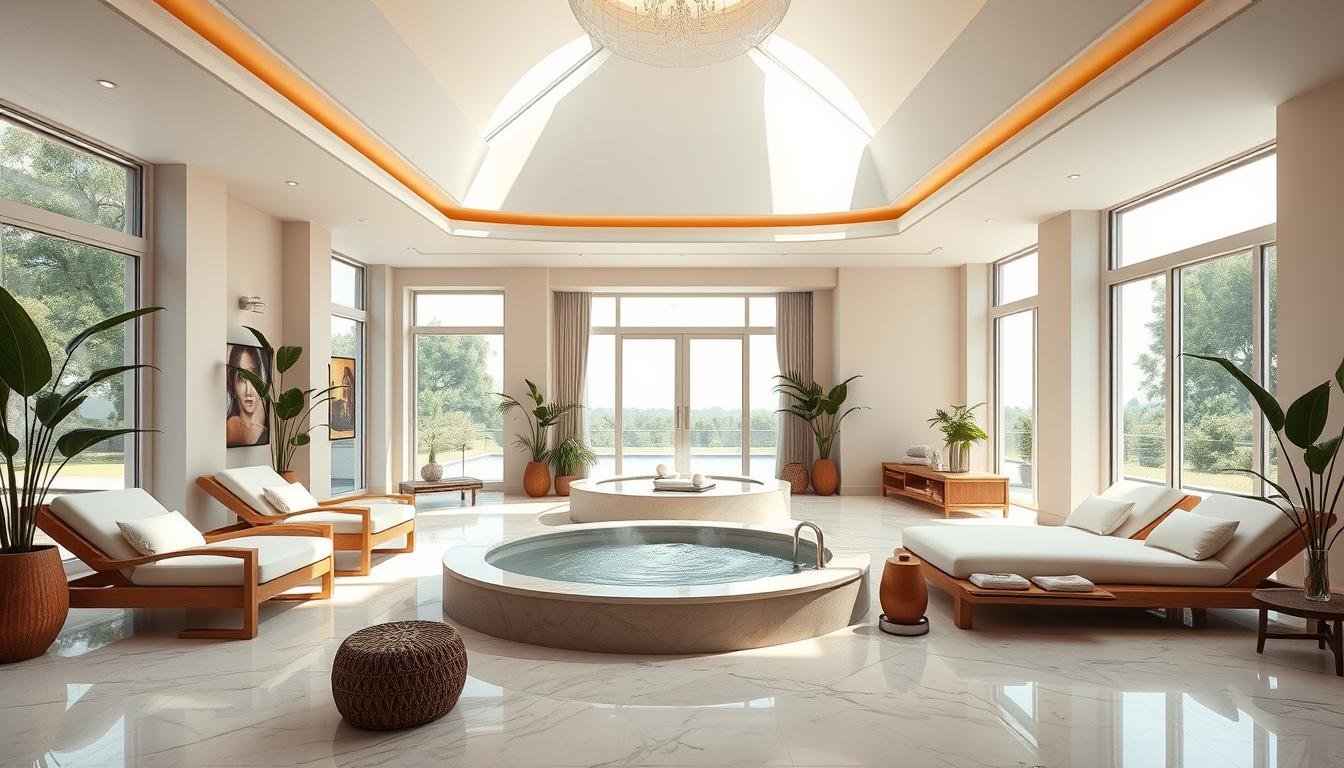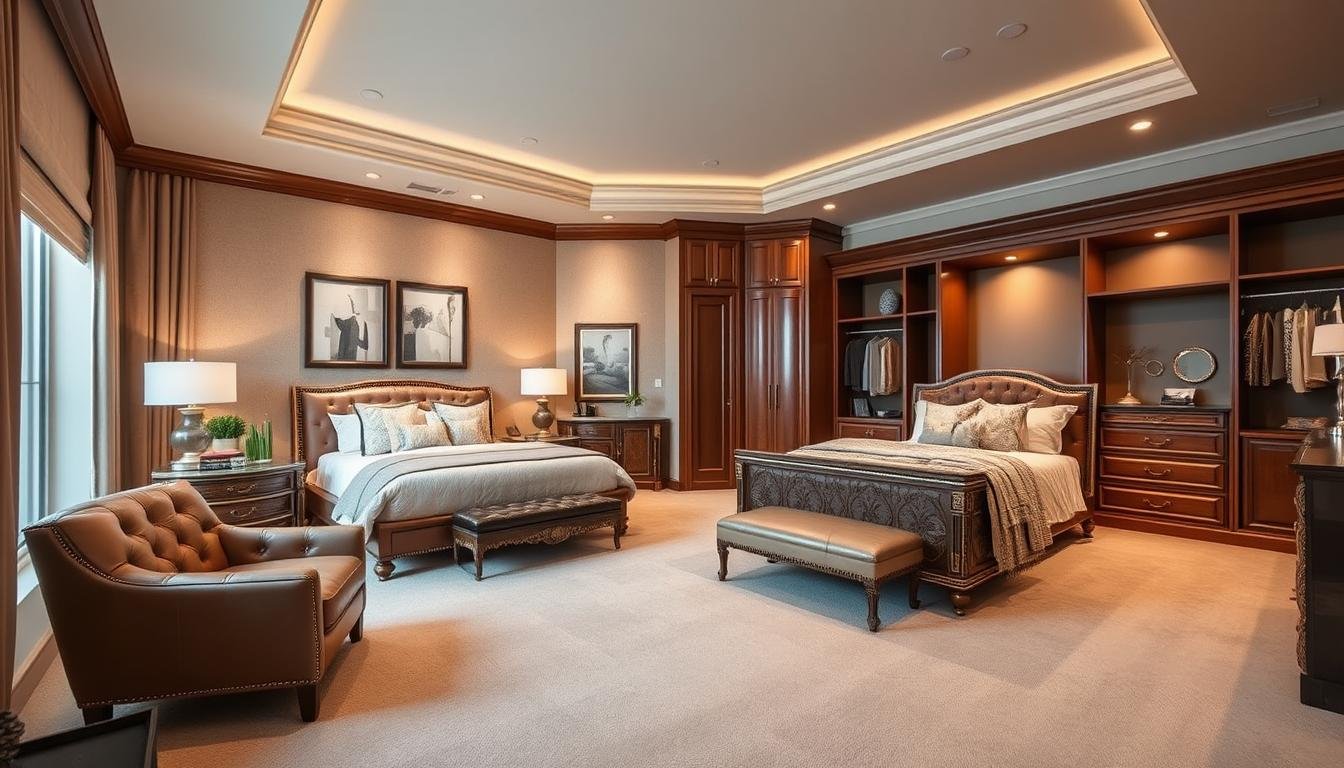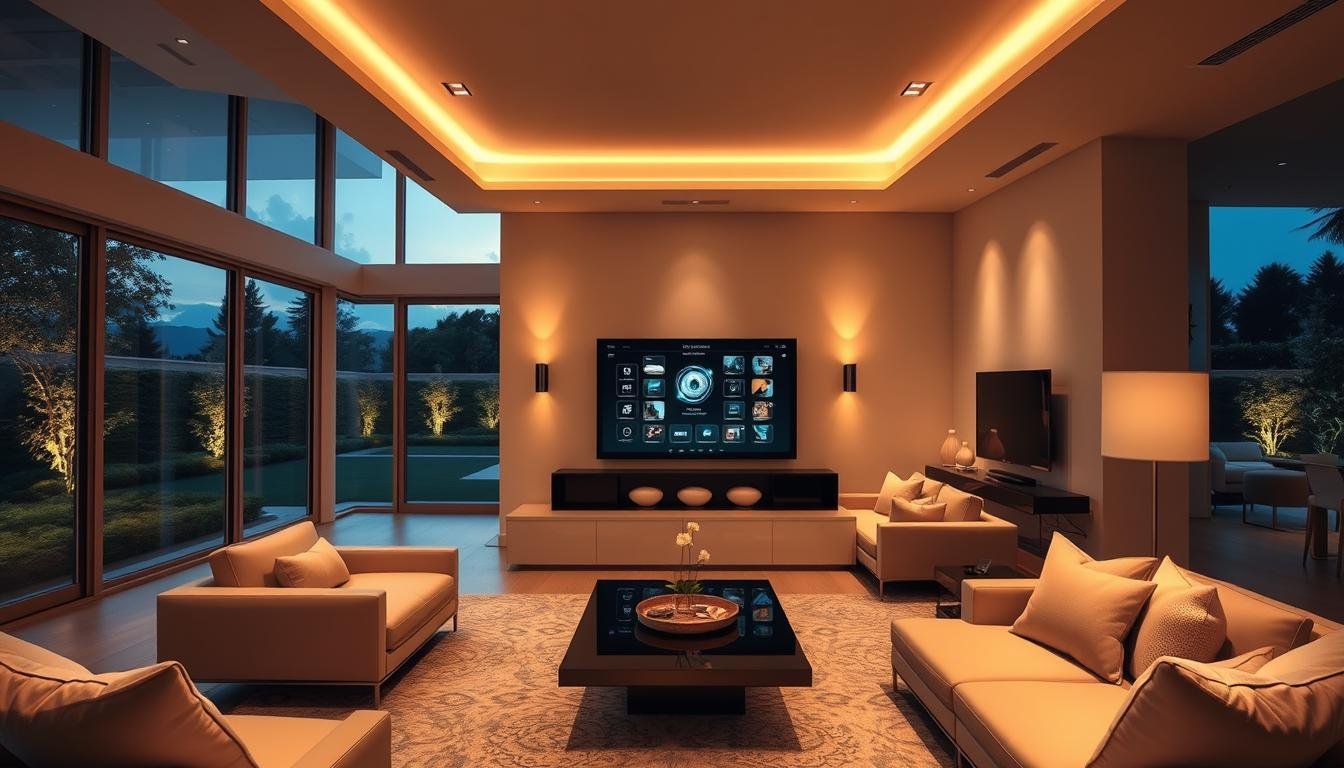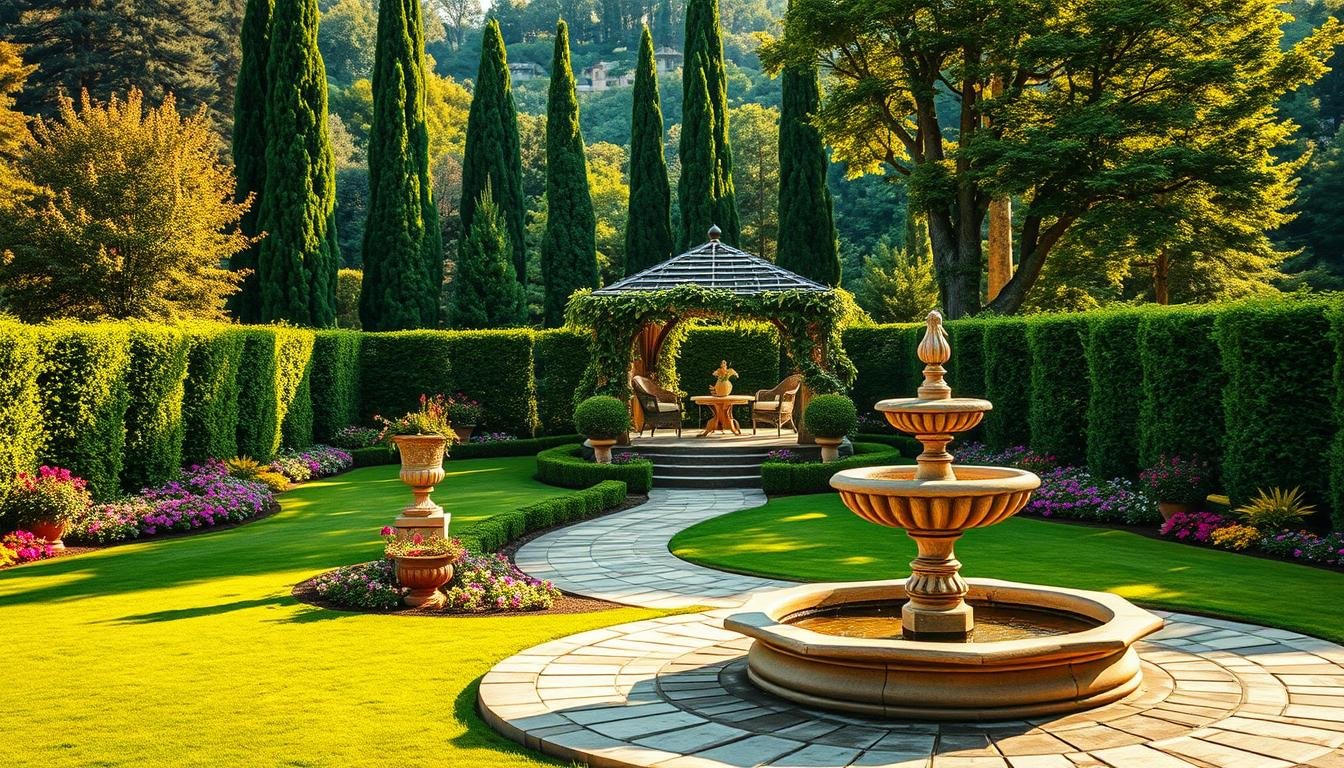Can a four-by-ten-foot ledge in a busy city become your calmest room? We think it can, and we’ll show how simple choices make that happen.
Across Indian cities, rooftop and kitchen gardens are rising as tools for mental wellness and cooler, cleaner air. Delhi’s draft urban farming policy even nudges residents toward greener homes, and compact outdoor space can answer that call.
Our approach focuses on practical circulation, seating, and greenery that fit a typical 4×10-foot area. We preview balcony design ideas like vertical planting, railing planters, and multi-use furniture that keep things tidy and safe.
We will also cover styling cues—from earthy tones to monochrome color schemes, plus quick checks for weight, sun hours, and drainage. Read on for actionable tips that turn a narrow ledge into a usable extension of your home.
Why Small Indian Balconies Deserve Big Design Energy
Even a compact outdoor ledge can offer a big boost to daily wellbeing in the city. We treat every square foot as useful real estate for calm, fresh air, and practical living upgrades.
Plants on rails cool surfaces, filter dust, and lift mood in high-rise life. Many apartments already have grills that make hanging and railing planters easy to fit into tight footprints.
Before you start, set a clear goal: a relaxation corner, a mini garden, or a work nook. Check sun hours and wind patterns; those two facts guide plant choices and furniture placement.
- Prioritize safety and weatherproof materials for monsoon resilience.
- Use railing planters and vertical systems to free the floor.
- Choose budget-friendly upgrades—DIY pots, string lights, and storage benches.
- Consider privacy screens and dense planting to buffer noise.
With a focused plan, even the narrowest ledge becomes an extension of your home that improves daily living and view. We show ideas that turn dead spaces into flexible, high-performing micro-spaces.
balcony design small house india: Our List of Smart, Stylish Wins
We lay out quick, high-impact moves that work for a typical 4×10-foot ledge in multi-story homes. These picks blend function with texture so the outdoor corner feels like a real extension of the interior.
Start with vertical solutions and slim furniture. Wall planters, tiered racks, and fold-down bistro sets free the floor while multiplying planting and seating options.
- Rail planters and macramé hangers to add green without crowding walkways.
- Textured cushions and woven accents for tactile interest and quick visual upgrade.
- Compact benches with hidden storage to keep tools and cushions tidy.
- Small fold-down tables for al fresco coffee or a simple evening meal.
- String lights and solar lanterns to create layered evening light.
Choose UV-stable fabrics and treated-wood looks for weather resilience. Tempered-glass or slim metal rails protect views and meet safety needs. These ideas scale across multi-story homes and help the narrow ledge feel purposeful and calm.
Go Vertical: Wall Planters, Shelves, and Green Walls
When floor room is limited, vertical planting lets us build a lush backdrop and keep circulation clear. Using walls and slim racks turns unused height into a living feature that expands visual depth without crowding the path.
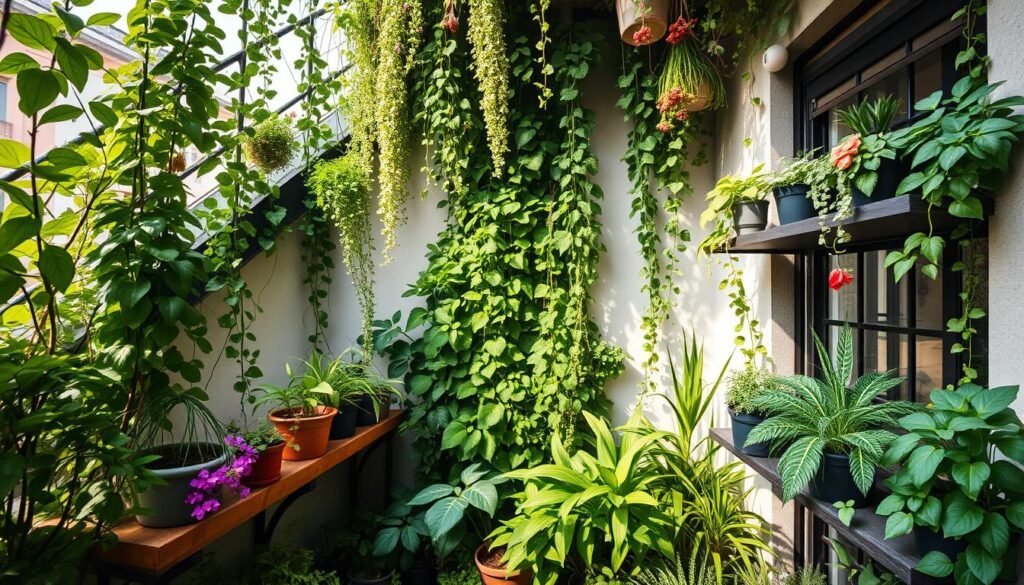
Wall-mounted planters, trellises, and tiered racks to stack more in less space
We recommend wall-mounted planters and trellises to free floor area while adding lush vertical interest. Tiered stands let us stack many pots in a corner so circulation stays open and useful.
Drip irrigation and self-watering vertical panels for low-maintenance greenery
Slim vertical garden panels with built-in drip irrigation cut daily chores. Self-watering systems and reservoir pots keep moisture steady through heat and monsoon shifts, so plants stay healthy with less fuss.
Best plant picks for sun vs. shade in Indian cities
For hot, sunny exposures choose okra or marigold; cooler, milder spots suit lettuce and strawberries. Herbs like tulsi and lemongrass, plus money plant, do well on walls and offer reliable yields.
- Pick rust- and UV-safe rack materials for tough weather and heavy rains.
- Anchor fixtures correctly on masonry or grills and spread weight to avoid overloading rails.
- Use light, well-draining mix and check drainage regularly to prevent root rot.
- Pair verticals with a slim bench or foldable chairs beneath for layered function.
Free the Floor: Hanging Baskets and Railing Planters
Elevating pots to the railing or ceiling turns edges into plant zones and leaves the floor for chairs. We prefer solutions that keep circulation clear while creating a layered, green feel.
Railing-mounted pots ring the perimeter so a slim bench or a pair of folding seats fit easily. Many Indian grills accept S-hooks, which makes attachment quick and secure.
Railing-mounted pots to ring the perimeter without crowding
Use slim metal or plastic planters along the edge to hold herbs and flowers. Spread weight across several railing sections and check fasteners before the monsoon.
Macramé hangers and staggered heights for a cascading look
Stagger hanging baskets from the ceiling or overhang to create depth. Mix store-bought macramé hangers with DIY upcycled cans and bottles painted bright colors.
- Ring the edge with railing planters to free floor space for chairs or a bench.
- Stagger hanging baskets from the ceiling for a cascading, lush effect.
- Use drip trays, set proper hook spacing, and follow watering routines to avoid mess.
- Balance weight evenly across rails and inspect fixes regularly for safety.
- Check sun and airflow so hanging clusters do not shade plants below.
Grow a Mini Kitchen Garden: Herbs and Veggies That Thrive in Pots
A tiny kitchen garden can turn a narrow ledge into a reliable source of fresh herbs and veggies. We focus on simple, low-risk choices that fit a typical balcony and keep maintenance light.
Starter list and layout tips
We recommend mint, coriander, green chilies, spinach, and cherry tomatoes for quick yields. Add tulsi, lemongrass, or curry leaves for regular cooking boosts.
- Use rectangular troughs or long planters to create neat rows and save floor space.
- Grow bags work well where weight matters; they improve root aeration and cut load.
- Most edibles need 4–6 hours of direct sun—check daily sun hours before planting.
Soil, feeding, and water care
Mix coco peat, compost, and a little sand for good drainage. Ensure all containers have holes and empty saucers after watering to avoid mosquitoes.
Feed with vermicompost tea or neem-cake-based fertilizers every few weeks in the growing season. Space seedlings so airflow stays healthy in humid weather.
These practical tips help a compact balcony garden feel like a usable extension of your home and give you fresh produce with modest effort.
Low-Maintenance Green Corners: Succulents, Snake Plants, and ZZ
Choose hardier species and simple routines to keep a green corner thriving with minimal fuss.
Aloe vera, jade, echeveria, snake plant, ZZ, and pothos tolerate irregular watering and busy schedules. We recommend self-watering planters and wicking spikes to buffer travel days and reduce daily chores.
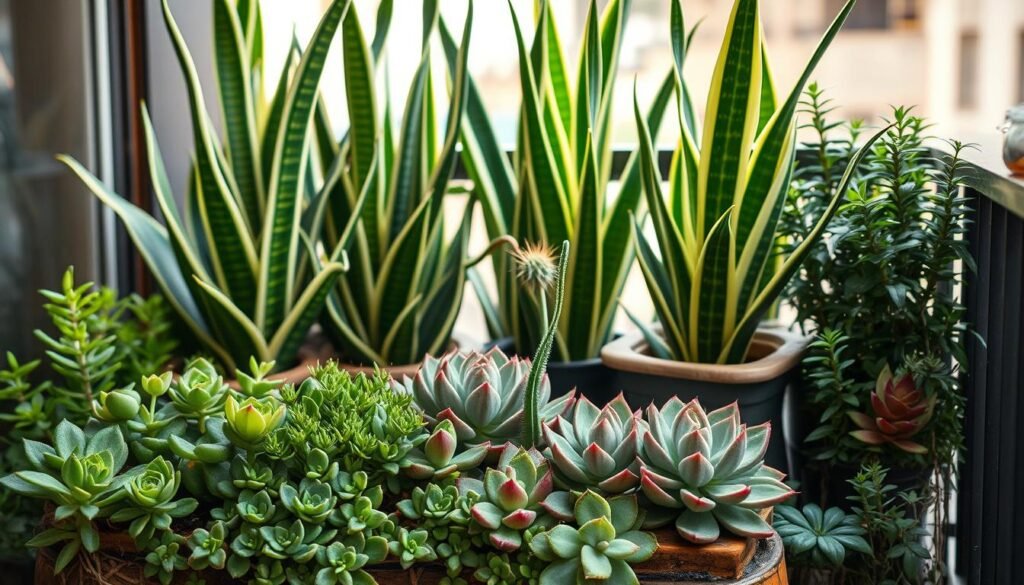
Use a well-draining mix—coco peat, compost, and grit—and pots with good drainage holes to prevent water stagnation in monsoon months. Group plants by water and light needs to simplify care and avoid overwatering.
- We curate resilient picks that thrive with little attention and fit a compact garden.
- Choose understated planters that match your balcony garden aesthetic and keep layouts airy.
- Mix sculptural succulents with upright snake plants for texture and height.
- Watch for mealybugs and aphids; treat early with mild neem oil sprays.
- Rotate pots periodically for even light exposure and balanced growth.
These practical ideas and tips help us build a low-effort green corner that feels fresh and intentional in any home. Keep routines simple, check drainage, and enjoy a calm, low-maintenance plant nook.
Add Flower Power: Small-Space Blooms with Big Impact
A few well-chosen flowering pots can make a compact outdoor spot feel lush and curated. We favor compact bloomers—marigolds, petunias for cooler months, portulaca, geraniums, periwinkle (vinca) in summer, and miniature roses—for steady seasonal interest.
Pair blooms with foliage such as coleus or crotons so the bed never looks bare between flushes. We also use colorful planters or painted DIY containers to amplify the visual punch and tie the scene into the overall color palette.
Layering matters: railing planters and hanging pots add depth and let us show blooms at multiple heights without crowding the floor. Follow sunlight cues—petunias do best with cool-season sun while vinca handles summer heat.
- Choose container-friendly flowers that suit local weather and pot sizes.
- Mix seasonal bloomers with evergreen foliage for year-round interest.
- Deadhead regularly and feed lightly to keep displays vibrant.
- Pick pollinator-friendly varieties to invite bees and butterflies.
- Balance bold blooms with neutral planters so the overall scheme feels curated, not chaotic.
Privacy the Natural Way: Climbers, Creepers, and Living Screens
Training creepers up ropes and jute creates shade, scent, and a soft visual barrier that breathes. We use living screens to get privacy without building solid fences. They also add texture and a garden element to the edge.
Trellises, ropes, and narrow planters that work
Use trellis panels, simple jute strings, or robust ropes fixed to a wall or railing to guide growth. Narrow planter boxes at the base give climbers a slim, secure root zone.
- Pick climbers like money plant, bougainvillea, jasmine, morning glory, and Rangoon creeper for color and fragrance.
- Match plants to sun: bougainvillea suits hot exposures; money plant favors partial shade.
- Prune regularly to keep views and let light through for neighbors.
- Check wind loads and tie supports firmly for multi-story safety.
- Ensure pots have drainage and use drip trays to avoid water marks on walls and floors.
Seating That Fits: Foldables, Bistro Sets, Benches, and Jhulas
Compact seating solutions let us stretch our living room outwards without crowding the path. We focus on pieces that fold or double as storage so the room stays flexible and neat.
Space-saving layouts that extend the living room outdoors
We recommend a pair of foldable chairs and a petite table to keep movement clear. A slim bench along the rail adds seating without blocking flow.
Hanging jhulas or a hammock chair become a cozy focal point when structure and weight checks allow. Match textiles to your living room so the outdoor zone feels like a natural extension of the home.
Built-in storage seating for tools, cushions, and throws
Built-in storage benches stash pots, cushions, and tools out of sight. Choose weather-tough cushions and quick-dry fabrics to stay monsoon-ready.
- Rubber feet and an outdoor rug protect floors and reduce slipping.
- Use a fold-down shelf or a compact service surface for coffee or snacks.
- Always check load limits before installing swing seating on upper levels.
| Option | Best for | Care | Weight/Notes |
|---|---|---|---|
| Foldable chairs + petite table | Flexible seating, dining | Wipe clean; fold when not in use | Low; easy to store |
| Slim storage bench | Tool and cushion storage | Dry cushions; ventilate storage | Moderate; distributes load |
| Hanging jhula / hammock chair | Relaxing focal seat | Check fixing points; cover in rain | High; requires structure check |
| Bistro set | Al fresco coffee or snacks | Metal/plastic: low care; wood: treat seasonally | Low to moderate; compact footprint |
Light It Right: String Lights, Solar Lanterns, and Cozy Glows
A thoughtful lighting plan extends outdoor space use after dusk and keeps the mood calm and usable. We use warm, low-glare fixtures so evenings feel relaxed and natural.
String lights and solar lanterns stretch usable hours without complex wiring. Festoon and fairy options on grills and trellises create a warm wash that flatters plants and faces. Solar choices cut maintenance and avoid new circuits.
We place hooks under the ceiling or overhang to hide cables and keep lines tidy. Weather-rated fixtures matter in monsoon months; pick IP-rated fittings and rust-proof fastenings for longevity.
- Outline grills and trellises with string lights for instant evening ambience.
- Layer solar lanterns and LED candles to add depth without electrical work.
- Choose warm color temperatures that flatter skin tones and plants at night.
- Balance brightness for dining versus unwinding—task beams versus soft glow.
- Add timers or smart plugs to save energy and automate routines.
We match lighting style to the overall look and combine minimalist and festive ideas so the seating and planters stay highlighted without glaring into neighbours’ windows. Small choices make a big after-dark impact.
Color Palettes That Pop in Indian Weather and Light
A carefully chosen palette can change how an outdoor nook reads at noon and after dusk. We focus on hues that look vivid in bright sun and still feel warm on cloudy, monsoon days.
Coastal and cooling tones
Aquas and aquamarine bring coastal calm. Mint greens cool visual heat in hot months and pair well with pale woods and white textiles.
Warm, energetic accents
Sunshine yellows, sunset corals, and soft oranges lift evening lounging zones. Use them sparingly as cushions or planter accents so the pop stays deliberate.
Earthy and monochrome options
Earthy terracotta, rattan browns, and moss tones give rustic warmth that complements clay pots and woven furniture. For an urban, monochrome style, choose sleek grays and deep charcoals for a refined, modern statement.
- We present palettes that read well in harsh sun and through wet weather.
- Pair colors across textiles, planters, and small decor for a cohesive look that ties back to the interior.
- Choose UV-stable paints and quick-dry fabrics to resist fading in bright light and humid months.
- Refresh cheaply each season with cushion covers or throws to shift the mood affordably.
Grills and Railings: Safety, Style, and Views
Selecting the right railing balances clear sightlines, weather resilience, and facade harmony. We prefer options that protect occupants while enhancing the front elevation and overall look. Safety, maintenance, and how the element pairs with your facade guide our choices.
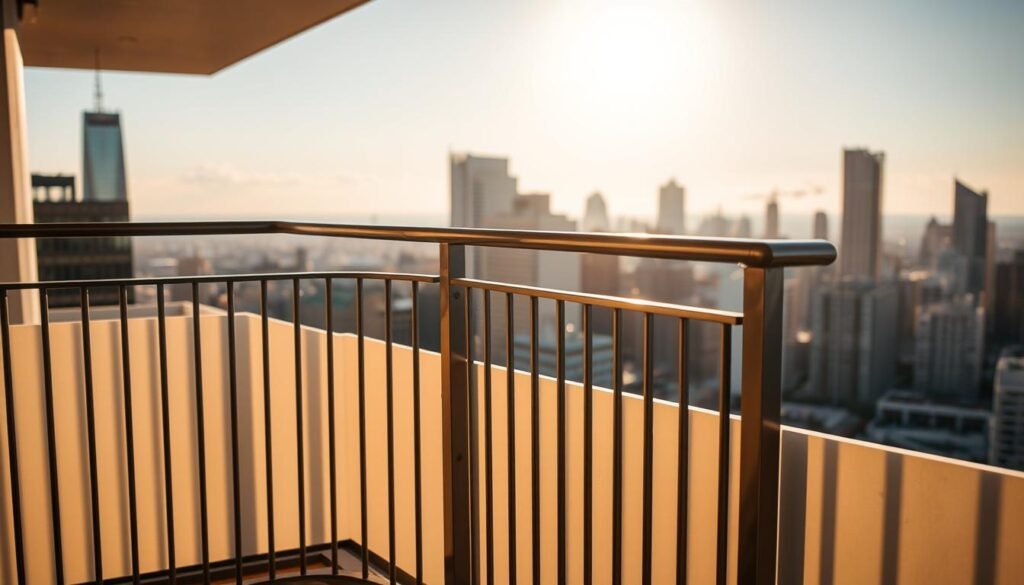
Material choices and their trade-offs
Tempered glass keeps views open and reads modern. It needs firm anchoring and periodic cleaning to avoid streaks.
Stainless steel gives long life and a crisp finish. It resists rust and suits a contemporary metal-heavy facade.
Vinyl offers budget-friendly upkeep and simple replacement. It works when low maintenance is a priority.
- Use frosted glass or patterned metal to balance privacy and openness.
- Choose corrosion-resistant finishes in coastal or monsoon-prone areas.
- Plan drainage and easy-clean surfaces to avoid staining and pooling.
- Integrate planter supports and climber anchors without compromising safety.
- Always meet local code for height, spacing, and anchoring on any house balcony.
| Material | Look | Durability | Maintenance |
|---|---|---|---|
| Tempered glass | Unobstructed, modern | High (shatter-resistant) | Frequent cleaning; seal checks |
| Stainless steel | Sleek, industrial | Very high | Low; polish and inspect fastenings |
| Vinyl | Clean, simple | Moderate | Low; occasional washing |
Design Themes We Love: Tropical, Minimal, Boho, Zen, and Mediterranean
From wicker-wrapped seats to terracotta pops, we outline five theme-led approaches you can apply to a narrow balcony. Each theme shows clear shopping choices and layout moves so you can update the space without a full overhaul.
Tropical retreat with wicker and vibrant blooms
We build a tropical story using wicker textures, leafy plants, and color-forward flowers. Pick rattan-look furniture, bold cushions, and tall palms or areca in planters for a lush, layered feel.
Minimal, modern lines for an urbane look
We dial in minimalism with slim furniture, a restrained palette, and clever storage. Compact tables and foldable seats keep circulation clear while the overall interior design reads calm and crisp.
Zen touches: pebbles, bonsai, and soft lighting
We craft a Zen sanctuary using pebbles, bonsai, and low ambient lights for evening meditation. Simple planters, muted textiles, and a small water bowl add calm without extra maintenance.
| Theme | Key elements | Top picks | Care notes |
|---|---|---|---|
| Tropical | Wicker, bold blooms | Rattan chair, tall palms, bright cushions | Water weekly; protect in monsoon |
| Minimal | Slim lines, neutral palette | Foldable set, slim bench, storage box | Wipe-clean fabrics; declutter monthly |
| Boho / Mediterranean | Textiles, terracotta, blues | Patterned rug, clay pots, woven shades | Sun-check pots; rotate textiles |
| Zen | Pebbles, bonsai, soft lamps | Low bench, bonsai pot, warm LEDs | Minimal watering; prune bonsai |
We coordinate planters, lighting, and textiles so each theme feels intentional. These ideas let you refresh the look seasonally and keep the space useful in your home.
Materials That Work: Weather-Resistant, Monsoon-Ready Choices
We pick materials so an outdoor ledge stays durable and calm through sun, storms, and humidity. Choosing the right surfaces and textiles means the space lasts and looks good with minimal fuss.
Rattan-look synthetics, treated woods, and quick-dry fabrics
Rattan-look synthetic wicker gives the warm weave of natural rattan without rot. Treated or composite wood offers the visual warmth of timber but resists swelling in heavy rains.
Use UV-stable, quick-dry fabrics for cushions to keep color and speed drying after showers. Rust-resistant hardware and powder-coated metal help furniture last longer in coastal and monsoon-prone spots.
- Easy-clean surfaces for planters and tables make post-rain wipe-downs effortless.
- Outdoor rugs and decking that drain reduce mildew risk and speed drying.
- Store soft goods during peak monsoon to extend lifespan and maintain interior textiles.
| Material | Benefit | Care |
|---|---|---|
| Synthetic rattan | UV and moisture resistant; woven look | Wipe with mild soap; avoid prolonged sun exposure |
| Composite wood | Stable in wet seasons; low warping | Periodic reseal; clean debris from seams |
| Quick-dry fabrics | Retain color; dry fast after rain | Machine wash covers; air dry fully before storage |
We match material choices to your overall design intent—sleek metal for modern, woven textures for warm homes—so the outdoor room feels like a natural extension of the interior.
DIY and Upcycling Ideas That Add Personality
A few simple crafts can turn old tins and bottles into a cohesive garden display. We focus on low-cost, city-friendly projects that suit an apartment ledge or balcony without heavy tools.
Painted cans, crates, and bottle planters for eco-friendly decor
Reclaimed paint cans, plastic bottles, wooden crates, and old buckets make great planters when wrapped in jute or finished with weather-safe paint. We recommend using liners and drilling drainage holes to protect roots and floors.
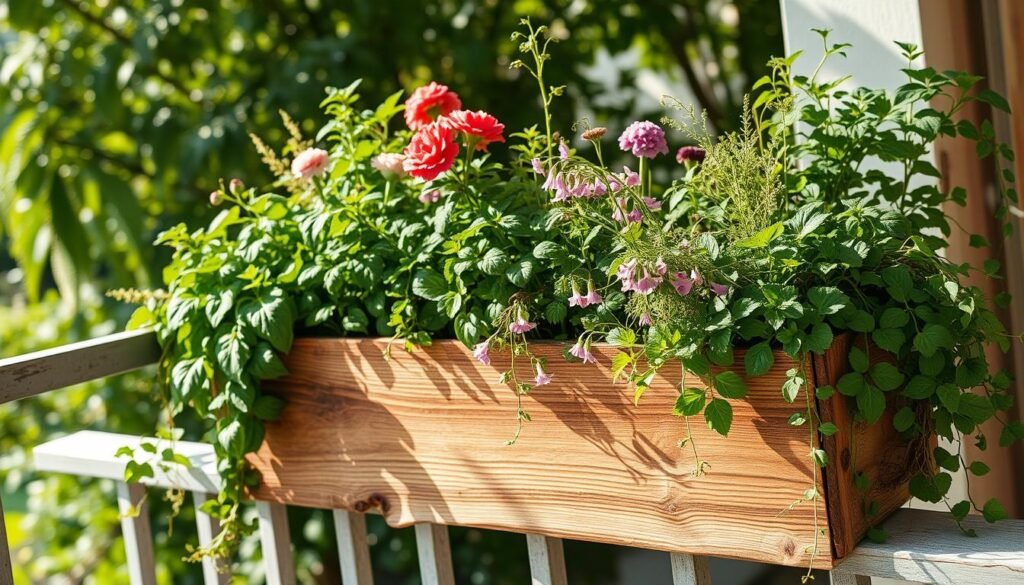
- Quick wins: painted cans, bottle planters, and crate shelves to personalize your home corner.
- Use jute wraps and exterior-grade paint to lift upcycled pieces and resist moisture.
- Always drill drainage holes and add a liner or tray to avoid leaks and pests.
- Layout tips: group similar colors and heights for a curated garden look.
- City and apartment projects: choose lightweight containers and check weight limits for railings.
- Combine DIY planters with a store-bought vertical rack for balance and ease.
- Make it a family session—simple crafts add personality and create shared memories.
Smart Space Planning: Typical Sizes, Vastu, and Weight Checks
Working with standard footprints, we place furniture and pots so circulation and comfort stay front and center. The average size balcony in many Indian flats is about 4 feet deep by 10 feet wide, which gives room for a narrow bench and a walking path.
We follow Vastu guidance where possible: north, east, or northeast orientations are preferred for a positive flow. For structural safety, heavier containers sit close to corners or load-bearing walls and lighter pots use coco-coir mixes to lower weight.
Practical tips keep the living extension usable. Leave clearance for door swings, drying racks, and cleaning access. Map sun and wind to position plants and seats for growth and comfort.
- Plan layouts for a 4×10 area so paths remain clear.
- Place heavy containers near structural supports.
- Use lightweight planters and soil mixes to reduce load.
- Integrate storage benches and vertical cabinets to save spaces.
| Aspect | Recommendation | Why it matters | Quick tip |
|---|---|---|---|
| Load distribution | Heavy pots near walls | Reduces structural strain | Spread weight across multiple supports |
| Orientation | North/east/northeast | Vastu & better morning light | Place herbs in morning sun |
| Access | Keep 2.5–3 ft clear path | Comfortable living and cleaning | Choose foldable furniture |
| Drainage | Maintain easy access | Prevents seepage and stains | Use removable trays and regular checks |
Trending Now: Vertical Gardens, Textures, and Multi-Functional Furniture
We see a clear trend: vertical garden statements, woven textures, and storage-forward pieces are shaping usable outdoor rooms. These moves make narrow ledges flexible for morning coffee, evening dinner, or a quiet break.
Woven accents, textured cushions, and dual-purpose pieces
We layer rattan-look weaves and textured cushions to add warmth and comfort. Textiles create a cozy feel while protecting finishes in humid weather.
Multi-functional furniture hides storage and keeps clutter out of sight. A slim bench with a lift-top or an ottoman that stores tools lets the area switch roles fast.
Al fresco dining nooks with bistro tables and starry lights
We carve a tiny dining nook with a compact table and foldable chairs for easy reconfiguration. String lights or solar starry lights above make the spot usable after dusk without extra wiring.
Choose modular pieces that shift from morning coffee to evening unwind. Seasonal covers, throws, and planters refresh the look without heavy work.
- Highlight vertical garden statements that turn walls into living art.
- Layer woven accents and textured cushions for visual warmth and comfort.
- Adopt multi-functional furniture to reduce clutter and add storage.
- Carve out al fresco dining with a compact table and starry lights overhead.
- Pick modular pieces that reconfigure for different uses in homes with limited outdoor space.
| Trend | Benefit | Best for | Quick tip |
|---|---|---|---|
| Vertical garden | Saves floor area; visual green wall | Railings and blank walls | Use lightweight pockets and drip trays |
| Textured accents | Warmth and tactile comfort | Seating and cushions | Choose UV-stable fabrics |
| Multi-functional furniture | Hidden storage; flexible layouts | Benches, ottomans, foldables | Test load limits and protect during monsoon |
Conclusion
Thoughtful moves can turn that narrow strip into a calm, green retreat. We wrap up with a few clear reminders to keep the space useful and joyful.
Use a quality potting mix with good drainage, feed plants regularly with organic options, and check pests early with neem or soapy water. Empty saucers after watering to stop mosquitoes and keep roots healthy.
Match interior design cues—materials, color, and texture—so the home balcony feels like an extra room. Add weather-ready chairs, cozy throws, and low-maintenance planters for year-round living comfort.
Extend evenings with solar choices and string lights for a warm glow. Adapt layouts to your sun pattern, check load and railing strength on any house balcony, and make the space yours with simple DIY touches.
With steady care and thoughtful color and design choices, a balcony garden becomes a true daily retreat we can enjoy all year.

